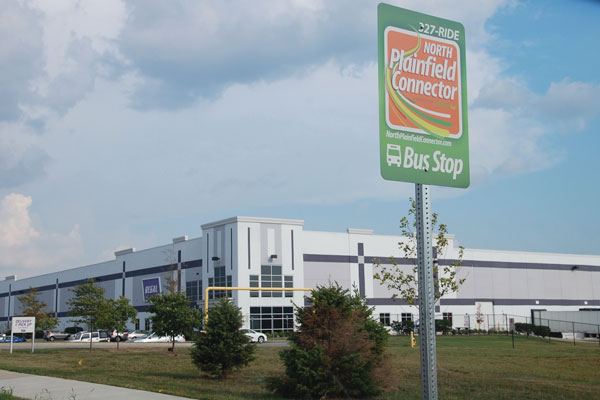Funding Transit to Industrial Properties
Employers in Plainfield, Indiana, are helping fund connector bus service that brings employees to local industrial parks.
IT'S BEEN MORE than 25 years since the central Indiana town of Plainfield embraced the transportation, warehouse and distribution industries with an aggressive, innovative business attraction effort. The town’s work paid off handsomely, and Plainfield is now one of North America’s key logistics hubs, with more than 40 million square feet of facilities at the end of 2016.

Connector buses funded by property owners through an economic improvement district (EID) make the “last mile” connection between Indianapolis bus routes and industrial parks in Plainfield, Indiana, helping companies to attract and retain employees.
In addition to welcoming new companies, the town quickly earned a reputation for working closely with local developers and landowners to support and strengthen employers already doing business within the town limits.
Over the past seven years, local leaders began to hear concerns from employers about training and labor shortages. Once again, the community took an innovative approach and reached out to Vincennes University, which located its Logistics Training and Education Center in one of Plainfield’s industrial parks. That gave employers a nearby source for training, as well as easy access to graduates from the program.
Plainfield’s leaders recognized that more than half of the local labor pool commuted from outside the community. Aware that reliable transportation was a barrier for many residents of neighboring Marion County (which includes Indianapolis) and that the Indianapolis transit system could not easily cross county lines, the town worked with the Central Indiana Regional Transportation Authority (CIRTA) to develop a connector bus. CIRTA helped Plainfield with its efforts to secure federal support, and the town launched the Plainfield South Connector bus, funded by a $390,000 federal grant and a $60,000 contribution from the town of Plainfield, for a total cost of $450,000 for three years. The service connects Plainfield to a busy Indian-apolis bus route that terminates just east of the town limits.
“Ridership on the Connectors has increased steadily, with approximately 28,000 trips in 2016,” says Lori Kaplan, executive director of CIRTA. “The Connectors have provided a vital link between the Indianapolis bus service and the unfilled jobs in Plainfield. Before the Connectors, taking public transportation to a job in Plainfield required at least a mile walk from the last bus stop in Indy to the closest work site in Plainfield. That was a deal killer for most potential employees.”
The effort was so successful that in two years, CIRTA received another federal grant to expand the program, thereby leading to the creation of the Plainfield North Connector route. That route was funded by a $360,000 federal grant and $90,000 from the town over three years, for a total cost of $450,000.
In 2015, federal funding for the South Connector ended. Plainfield began to explore options for sustainable funding, and town officials agreed to fund the route until they could identify a long-term source. CIRTA officials suggested that the town use a provision in Indiana law to establish an economic improvement district (EID), a voluntarily created area established through a petition process that gives property owners a way to generate funding for mutually beneficial projects.
In six months, the proposed EID earned the support of three-quarters of the parcel owners, representing more than half of the total assessed valuation of parcels in the district. The owners agreed to make contributions that would provide a sustainable funding model to 1) encourage retention of existing companies; 2) support a new workforce pipeline; and 3) continue operating the Plainfield South Connector so employees could continue to commute to employers in the district.
Kelley and Associates, a firm focused on helping communities form sustainable strategies addressing local needs, spearheaded the petition project. In December 2016, it joined with several representatives from the property owners to formally present the petition, a plan of action and a budget to the Plainfield Town Council. The petition recommended that each property owner contribute at an annual rate of $0.00034 (0.034 cents) per $1,000 in assessed valuation; the average cost amounts to less than one cent per square foot. “We see the EID as a proactive way to attract talent in a growing market,” notes Jill Evans, portfolio manager for The Meritex Co. “While no one desires to pay more in taxes, we appreciate an approach in which property owners have a voice in the budget and operations.”
“Labor is increasingly becoming a primary issue and concern for companies looking to enter the marketplace. It is one of the single most important drivers of the location decision,” explains Douglas Swain, vice president and general manager of Opus Development Co. LLC. “The Plainfield Economic Improvement District will help alleviate concerns and provide support for companies looking to attract additional labor, leading to better attraction and retention. I think this is a win for Plainfield.”
The town council immediately approved the petition, ensuring that employers in the community’s logistics district would be able to provide reliable transportation to the employees and potential hires who need it most. “The town recognizes that to be a partner with the many businesses in our community, we have to be forward-thinking in addressing their needs,” says Robin Brandgard, town council president. “It’s why we were supportive of the bus service from the beginning, first providing the match for the federal grant and, second, working with CIRTA to continue funding until the EID could be established. We were anxious to find out if public transit would satisfy a need for local employers. Once the demonstration proved the service worked, we wanted to help find a way to make it sustainable.”
Cinda Kelley, president, Kelley and Associates LLC




